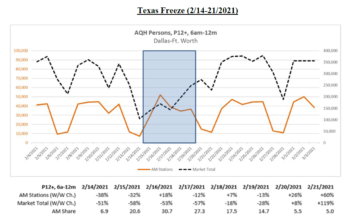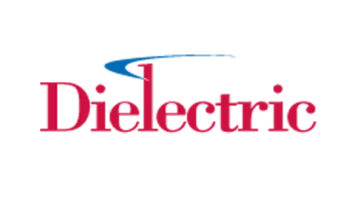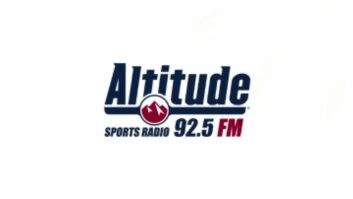iHeartMedia thinks the FCC should eliminate the restriction on how many AM stations one company can own in a given market. But it opposes the “overly aggressive” proposal by the National Association of Broadcasters to raise or eliminate the similar cap on FM stations.
The company believes that within broadcast radio, AMs face a “growing and distressing competitive disadvantage” to FM stations, despite the role played by AMs in national security communications and the “outsized place of AM stations as trusted sources of local news and information.”
That has been iHeart’s position for some time. Now the company has reiterated its stance in a September filing with the FCC. The commission had invited comments to update its record in the still-open 2018 quadrennial review of media ownership rules.
This is an excerpt of the summary section of iHeart’s filing:

Legal developments subsequent to the closing of the original comment period in this proceeding have strengthened significantly the bases for iHeart’s earlier advocacy.
The twisting course of the litigation challenging the commission’s 2010/2014 Quadrennial Reviews has left the regulatory landscape as it was when the commission received comments and reply comments. Importantly, however, there has not been a meaningful opportunity to ascertain the impact on the marketplace of either the substantial deregulation effectuated by the commission’s November 2017 Order on Reconsideration or its August 2018 Order establishing the Incubator Program.
[See Our Business and Law Page]
The Supreme Court decision reversing the Third Circuit reaffirmed the commission’s reasonable exercise of its authority in applying the broad public interest standard governing Quadrennial Reviews, implicitly rejecting the argument that competition should be the predominant criterion for determining whether to retain, modify or repeal broadcast regulations.
The antitrust actions against Facebook and Google filed by the FTC and the Department of Justice, joined by the vast majority of state attorneys general, also have significant implications for this proceeding.
In the complaints in these cases, the federal government and the states have been explicit in arguing that the relevant advertising markets for the Big Tech companies are separate and distinct from the television and radio broadcast advertising markets and that broadcast radio and television are not substitutable for the social media and search services and related advertising markets of Facebook and Google.
Thus, the federal and state governments have taken the same position utilizing the same analytical framework regarding the relevant market as iHeart has advanced in this proceeding.
Finally, on July 9, 2021, President Biden signed an “Executive Order on Promoting Competition in the American Economy,” reflecting the administration’s view that excessive market concentration is harmful to competition.
Of particular relevance to the instant proceeding, the Executive Order encouraged agency heads to pay particular attention to the influence of regulations on concentration in industries within their jurisdiction. Adoption of the NAB’s proposal would be inconsistent with the thrust of the Executive Order on Competition.
“Seismic events”
While these legal developments are directly relevant to this proceeding, the seismic events that have challenged our nation in the past two years also have a bearing on its outcome.
The COVID-19 pandemic, the pervasiveness of misinformation and disinformation on social media and hundreds of internet websites and its disruptive effect on our political processes, and a reawakening about the role race plays in our society following the murder of George Floyd, have underscored the critically important role broadcast radio plays in our country’s life.
Consistent with the examples highlighted in iHeart’s Comments, empirical listening data during the past two years continued to demonstrate that people tune to their local radio stations, especially AM stations, in times of heightened concern, both with respect to local, natural or human-caused disasters and at moments of acute national crisis. Broadcast radio has been an indispensable source of official and factual information about the COVID-19 pandemic, including how best to avoid infection, where to get tested, local and regional infection rates, hospital capacity and the importance, efficacy and availability of vaccines.
[Related: More Change for Radio Ownership Rules?]
Regarding the reexamination of the role of race in American society, iHeart launched the Black Information Network (BIN) in 2020, a 24/7 comprehensive, national, audio Black news service dedicated to providing a trusted source of continual news coverage with a Black voice and perspective. iHeart already has repurposed more than 30 local stations serving large Black populations, the majority of which are AM stations, to be additive to — but not directly compete with — existing Black-owned radio stations.
We continue to support the FCC’s Incubator Program, believing that it should be afforded a meaningful opportunity to succeed in enhancing ownership of broadcast properties by women and minorities, an outcome that would be at risk were FM ownership limits to be relaxed or eliminated.
In light of the increased centrality of broadcast radio to our national information and communications infrastructure, sustaining its economic viability, particularly the more financially vulnerable AM band, should be of paramount concern to the FCC.
Whether measured by numbers of stations on air, audience listening or advertising revenue, broadcast radio has suffered from the broader economic fallout of the COVID-19 pandemic.
On the other hand, there are promising signs that broadcast radio will rebound, including the broader economic recovery, portending increased advertising, and dramatically increased driving in recent months, likely translating into greater audience listening.
It is premature, however, to predict the extent and contours of that recovery, and it is too soon to have reliable, empirical, economic data upon which the commission could make predictive judgments.
“Targeted, moderate”
The net effect of these developments is that the positions taken by iHeart in its Comments and Reply Comments ring as true today — indeed, more so — as when we conveyed them to the commission more than two years ago. Accordingly, the commission should adopt a targeted, moderate approach to reforming the local radio ownership rules by eliminating only the limits on AM stations while retaining the current limits on FM stations.
Doing so will avoid the potentially catastrophic harm that could befall AM stations were the commission to adopt the NAB proposal to deregulate substantially the FM band. Moreover, by maintaining the current FM subcap limits, the commission will ensure that the financial incentives essential to the success of the Incubator Program remain in place. The commission should be guided by the overarching principle of doing no harm.
iHeart’s filing went on to develop these arguments in more detail. You can read a PDF of the full filing at https://tinyurl.com/rw-ihm-2.
Comment on this or any article. Write to [email protected].












